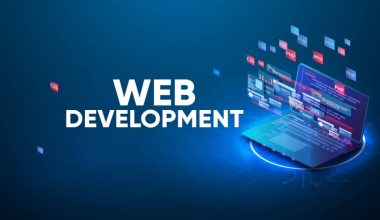With the rapid development of technology and the ever-increasing demand for skilled tech professionals, Nigerian students are faced with many opportunities in the field.
From software development to cybersecurity, digital marketing to data science, tech offers many exciting careers for those with the right skills and knowledge. But with so many options, where should Nigerian students begin their journey?
In this article, we will talk about the top 20+ tech courses for Nigerian students in 2025. This article is for you as a Nigerian student or a parent or educator looking to support the next generation of tech professionals.
Table of contents
- Tech courses for Nigerian students
- 1. Software development
- 2. Cybersecurity
- 3. Digital marketing
- 4. Data science
- 5. Web development
- 6. Artificial Intelligence (AI) and Machine Learning (ML)
- 7. Graphic design
- 8. UX (User Experience) design
- 9. Robotics
- 10. Digital animation
- 11. Video game development
- 12. Blockchain technology
- 13. IoT (Internet of Things)
- 14. Virtual Reality (VR) and Augmented Reality (AR) development
- 15. App development
- 16. E-commerce development
- 17. Cloud computing
- 18. Data analytics
- 19. DevOps
- 20. Machine learning
- 21. Natural Language Processing (NLP)
- 22. Digital forensics
- Which tech skills are in high demand in Nigeria?
- What technology should I learn in 2024?
- Which skill will be most required by 2025?
- Which technology course is best for future?
- FAQs
- Conclusion
- References
- Recommendations
Tech courses for Nigerian students
Here’s 20+ tech courses list you can choose from as a Nigerian student:
- Software development
- Cybersecurity
- Digital marketing
- Data science
- Web development
- Artificial Intelligence (AI) and Machine Learning (ML)
- Graphic design
- UX (User Experience) design
- Robotics
- Digital animation
- Video game development
- Blockchain technology
- IoT (Internet of Things)
- Virtual Reality (VR) and Augmented Reality (AR) development
- App development
- E-commerce development
- Cloud computing
- Data analytics
- DevOps
- Machine learning
- Natural Language Processing (NLP)
- Digital forensics
1. Software development
The first on our list of tech courses is software development. This involves the process of designing, creating, and testing software applications and programs for various purposes, such as web applications, mobile apps, and desktop applications.
Software developers use programming languages like Java, Python, and C++ to create software, which requires a strong foundation in computer science and problem-solving skills.
To get started in software development, it’s important to develop your programming skills and learn about different software development methodologies and tools. You can do this by taking online tech courses in this field, reading tutorials and books, and working on personal projects.
Read: Which Course is Best for Art Students in Nigeria? Top 20 Art Courses
2. Cybersecurity
Another popular tech course is cybersecurity. This involves protecting computer systems, networks, and data from unauthorized access, theft, or damage.
Cybersecurity professionals use a variety of tools and techniques to detect and prevent cyber threats, such as hacking, malware, and data breaches.
To become a cybersecurity professional, you need to understand computer systems and networks, cryptography, ethical hacking, and risk management. You can start by taking cybersecurity courses – you can find tons of free tech courses online in this field.
And you can participate in cybersecurity challenges and competitions, and obtain relevant certifications.
See: 10 Cybersecurity Scholarships for Nigerian Students | 2024
3. Digital marketing
The third on our list of tech courses we’ll discuss is digital marketing. This involves using digital channels like social media, search engines, and email to promote products and services. Digital marketers create and distribute content, manage social media accounts, and run campaigns to reach and engage with their target audience.
To excel in digital marketing, you need to have strong communication and analytical skills, as well as knowledge of marketing strategies, digital platforms, and analytics tools.
You can get started by taking digital marketing courses online. There are tons of free tech courses with certificate online in this field.
Also, you can learn how to use popular marketing tools like Google Ads, Facebook Ads, and Google Analytics.
4. Data science
This involves extracting insights and knowledge from large amounts of data using analytical techniques and tools like machine learning and data visualization.
Data scientists work in a variety of industries, such as finance, healthcare, and marketing, and are responsible for analyzing and interpreting data to help businesses make better decisions.
To succeed in data science, you need to be proficient in programming languages like Python and R and have a solid understanding of statistical concepts and machine learning techniques.
5. Web development
Another important tech course is web development. This involves building, designing, and maintaining websites and web applications using languages like HTML, CSS, and JavaScript.
Web developers work on both the front-end (the part of the website that users see) and the back-end (the server-side components that power the website).
For this course, you need to have a strong understanding of web technologies and user experience design principles. You can start by learning HTML, CSS, and JavaScript, and then move on to more advanced topics like responsive design, server-side programming, and database management.
6. Artificial Intelligence (AI) and Machine Learning (ML)
The sixth tech course on our list is artificial intelligence (AI) and machine learning (ML). AI involves developing computer systems that can perform tasks that normally require human intelligence, such as visual perception, speech recognition, decision-making, and language translation.
ML is a subfield of AI that focuses on using algorithms and statistical models to enable machines to learn from data and improve their performance over time.
To get started in AI and ML, you need to be proficient in programming languages like Python and have a strong understanding of machine learning algorithms and techniques.
7. Graphic design
This course involves creating visual content for various purposes, such as branding, advertising, and web design. Graphic designers use tools like Adobe Photoshop, Illustrator, and InDesign to create logos, posters, infographics, and other visual assets.
To be great in graphic design, you need to have a strong sense of aesthetics, as well as an understanding of typography, color theory, and design principles.
You can start by taking courses in graphic design software, and then build your portfolio by working on personal projects or freelance jobs.
Also, read: 21 Best Free Graphic Design Classes Online | Beginners & Experts
8. UX (User Experience) design
This involves creating digital products, such as websites and mobile apps, that are easy and enjoyable to use. UX designers use a range of methods and tools, like user research and wireframing, to understand user needs and preferences, and create intuitive and engaging user interfaces.
To become a UX designer, you need to have strong communication and problem-solving skills, as well as a passion for creating delightful user experiences.
You can start by taking courses in UX design principles, and then build your portfolio by working on personal projects or participating in UX design challenges.
9. Robotics
Robotics involves designing, building, and programming robots to perform a wide range of tasks, from industrial automation to healthcare and personal assistance. Robotics engineers use a variety of skills, including mechanical engineering, electrical engineering, computer programming, and artificial intelligence.
To get started in robotics, you need to develop strong skills in areas like math, physics, and computer programming.
You can start by taking robotics courses and participating in robotics clubs or competitions, and then specialize in a particular area of robotics like control systems, sensors, or robot arms.
10. Digital animation
Moving on to our tenth tech course, we have digital animation. Digital animation involves creating moving images using computer software like Adobe After Effects and Maya.
Animators use their creativity and technical skills to create stunning visual effects, character animations, and visual storytelling for movies, TV shows, video games, and more.
To become a digital animator, you need to develop strong artistic skills and learn how to use animation software.
You can start by taking courses in animation principles, storyboarding, and 2D and 3D animation techniques, and then build your portfolio by creating animations for personal projects or freelance jobs.
See: Top 3D Modeling Courses Online In 2024
11. Video game development
Up next, we have video game development. Video game development involves creating video games for platforms like PC, console, and mobile.
Game developers use programming languages like C++ and Unity, as well as game engines and development tools, to design and build immersive gaming experiences that engage and entertain players.
To become a pro in video game development, you need strong problem-solving and programming skills, as well as an understanding of game design principles.
You can start by taking courses in game development and learning how to use game engines like Unity and Unreal Engine.
See: 15 Best Online Game Development Schools In the World
12. Blockchain technology
Blockchain is a decentralized, digital ledger of transactions that’s used to record and verify information. Blockchain developers use programming languages like Solidity and Python to build decentralized applications, smart contracts, and cryptocurrency platforms.
To become a blockchain developer, you need to understand cryptography, data structures, and algorithms, as well as the fundamentals of blockchain technology.
You can start by taking courses in blockchain development and learning how to use blockchain platforms like Ethereum and Hyperledger Fabric.
13. IoT (Internet of Things)
IoT involves connecting everyday devices to the internet, like smart home appliances and wearable technology, and using data analytics to improve efficiency and convenience.
IoT developers use programming languages like Python and Java to build IoT solutions for industries like healthcare, manufacturing, and smart cities.
To become an IoT developer, you need to understand embedded systems, network protocols, and data analytics, as well as how to design and implement IoT solutions. You can start by taking courses in IoT development and learning how to use IoT platforms like Arduino and Raspberry Pi.
14. Virtual Reality (VR) and Augmented Reality (AR) development
VR and AR developers create immersive, interactive experiences that blend the virtual and physical worlds.
They use programming languages like Unity and C++, as well as VR and AR tools, to create simulations, games, and training applications for industries like education, entertainment, and real estate.
To excel in VR and AR development, you need strong problem-solving and programming skills, as well as an understanding of VR and AR technologies.
15. App development
App developers create software applications for mobile devices like smartphones and tablets. They use programming languages like Java, Swift, and React Native, as well as tools like Android Studio and Xcode, to build apps for industries like e-commerce, gaming, and social media.
To become an app developer, you need strong programming and problem-solving skills, as well as an understanding of mobile app design principles and user experience (UX) best practices.
16. E-commerce development
E-commerce developers build and maintain online stores and marketplaces that allow businesses to sell their products and services to customers around the world.
They use programming languages like PHP, JavaScript, and Python, as well as e-commerce platforms like Shopify and WooCommerce, to create shopping experiences that are fast, secure, and convenient.
To become an e-commerce developer, you need strong programming and problem-solving skills, as well as an understanding of web development and database management principles.
17. Cloud computing
Cloud computing involves the delivery of computing services over the Internet, including storage, networking, databases, software, and more.
Cloud computing developers use tools and platforms like Amazon Web Services (AWS), Microsoft Azure, and Google Cloud Platform (GCP) to build cloud-based solutions that are scalable, secure, and cost-effective.
To excel in cloud computing, you need strong programming and problem-solving skills, as well as an understanding of cloud computing concepts like virtualization, containerization, and serverless
18. Data analytics
Data analytics involves collecting, organizing, and analyzing large amounts of data to identify patterns, trends, and insights. Data analysts use tools like SQL, Python, and Tableau to create reports, dashboards, and visualizations that help businesses make informed decisions.
To excel in data analytics, you need strong analytical and problem-solving skills, as well as an understanding of data analysis concepts like statistical analysis, data mining, and machine learning.
19. DevOps
DevOps involves using a combination of tools and practices to improve the speed, reliability, and efficiency of software development and delivery.
DevOps engineers use tools like Docker, Jenkins, and Ansible to automate the software development and deployment process, and to ensure that new features and updates are released quickly and reliably.
To excel in DevOps, you need strong programming and problem-solving skills, as well as an understanding of DevOps concepts like continuous integration, continuous delivery, and containerization.
20. Machine learning
Machine learning involves using algorithms and statistical models to enable machines to learn from data and make predictions without being explicitly programmed. Machine learning engineers use tools like Python, TensorFlow, and PyTorch to build machine learning models that can be used in a variety of applications, from self-driving cars to fraud detection.
To excel in machine learning, you need strong mathematical and programming skills, as well as an understanding of machine learning concepts like supervised and unsupervised learning, neural networks, and deep learning.
Also, see: Top Deep Learning Online Courses
21. Natural Language Processing (NLP)
NLP involves teaching machines to understand and generate human language, allowing them to perform tasks like language translation, speech recognition, and sentiment analysis. NLP engineers use tools like Python, NLTK, and spaCy to build NLP models that can be used in applications like chatbots, voice assistants, and machine translation.
To excel in NLP, you need strong programming and mathematical skills, as well as an understanding of NLP concepts like linguistics, machine learning, and information retrieval.
22. Digital forensics
Digital forensics is also another one of the tech courses to go for as a Nigerian student. It involves analyzing digital evidence like computer files, smartphones, and network traffic to solve crimes and solve security incidents. Digital forensics professionals use tools like EnCase, FTK, and Autopsy to recover and analyze digital evidence.
To excel in digital forensics, you need strong problem-solving and analytical skills, as well as an understanding of digital forensics concepts like data recovery, file system analysis, and network forensics.
Which tech skills are in high demand in Nigeria?
Nigeria is growing in technology, and many tech skills are in high demand. Let’s talk about some of them:
- Software Development: A lot of Nigerian companies need software developers to build new products and services. This helps them solve problems like how to make it easier for people to buy things online or how to communicate with people better.
- Cybersecurity: People who are good at cybersecurity help protect companies and people from bad people who want to steal their information or harm their computers.
- Digital Marketing: Digital marketing helps companies advertise their products and services online, like on social media and email. It helps companies reach more people and sell more things.
- Data Analytics: Data analytics is about looking at data to find out information about customers and other things. This helps companies make better decisions about what they should sell and how they should sell it.
- Cloud Computing: Cloud computing is about using computers in the cloud to store and manage data and applications. This helps companies save money on buying and managing computers themselves.
What technology should I learn in 2024?
One technology that you should learn in 2024 is data analytics. Data analytics is very important for a lot of different kinds of businesses. It helps them understand their customers better and make better decisions.
If you learn data analytics, you will be able to help companies by looking at data and finding out things like what people want to buy, when they want to buy it, and how much they want to pay for it.
Data analytics is a technology that can be used in many different industries. For example, a retail store can use data analytics to find out which products are selling the most and which are not selling well. Then, they can use that information to decide which products to sell more of and which ones to stop selling.
Data analytics can also be used in healthcare to find out things like which treatments work best for which patients. This helps doctors give better care to their patients.
As you can see, data analytics is a very important technology that can be used in many different ways.
Also, see: 20+ Popular Coursera Courses Online in Nigeria
Which skill will be most required by 2025?
Artificial Intelligence is one skill that will be very much needed by 2025. That is because AI can do a lot of things that humans can’t do, like understand and learn from huge amounts of data, make decisions without getting tired, and do tasks like driving cars or translating languages very quickly.
Another skill that will be needed is cybersecurity. Cybersecurity is about protecting computers and networks from hackers and other bad people who want to steal or damage information.
This is important because as more and more things become connected to the internet, like smart home devices and cars, there will be more chances for bad people to do bad things.
Another skill that will be important in the future is design thinking. Design thinking is about understanding people’s needs and finding creative solutions to problems. It is not just about making things look good, but also about making them work well for the people who use them.
For example, if a company is making a new phone, they might use design thinking to make sure that the phone is not only easy to use but also beautiful and feels good to hold in your hand.
Design thinking can be used in a lot of different fields, like healthcare, education, and even government.
Which technology course is best for future?
It’s hard to say which technology course is the best for the future because it depends on what you’re interested in and what kind of job you want. But, if I had to choose one, I think that Artificial Intelligence and Machine Learning (AI and ML) is the most exciting and promising technology.
That’s because AI and ML have so many different uses. For example, AI can be used to make better medical diagnoses, create more efficient factories, and even help us understand the universe better.
But if you’re more interested in data and information, then Data Science and Analytics could be a great choice. Data is everywhere these days, and the people who know how to understand and use it are going to be in high demand.
And if you’re more interested in cybersecurity, that’s also a great choice. With more and more things connected to the internet, cybersecurity will only become more important in the future.
These courses are actually all useful and are some of the top best for the future. All you may need to do is find where our strength lies in either of the mentioned courses and go for it!
Which course is best for the future in Nigeria?
One course that will be very important in the future in Nigeria is computer science. Computer science is all about how computers work and how we can use them to do different things, like build websites, create games, or even make robots.
In the future, computers will be even more important than they are now, and people who know how to use them will be able to do amazing things.
Computer science is not just about learning how to code, but also about learning how to think like a computer scientist. That means understanding how computers solve problems and communicate with each other.
See Also: 20+ Udemy Free Courses with Certificates | 2024
Which technology is best in future 2025?
Blockchain technology!
Blockchain technology is like a powerful digital bookkeeper that keeps track of all our digital stuff. It’s not just for money anymore, but it can also be used in a bunch of different ways, like making sure that stuff gets where it needs to go, making healthcare better, and even helping people vote.
Blockchain is expected to make a big impact in the future by 2025, and it’s going to change a lot of things for the better.
So, how does blockchain do all this? Well, it’s because it keeps track of stuff in a way that makes it really hard for anyone to cheat or mess with the records. That means that people can trust the information on the blockchain, and they can use it to do all kinds of cool things.
For example, if you want to make sure that your food is grown in a good way, blockchain can help you track where the food came from and how it was handled.
FAQs
Artificial Intelligence and Machine Learning are predicted to have the biggest impact on the future by 2025.
Artificial Intelligence, Machine Learning, and Blockchain are set to boom in the future.
Cybersecurity, Data Science, and Machine Learning skills will be in high demand by 2025.
Conclusion
These tech courses are all very important for the future and the best one for you will depend on your strengths and interests.
Whichever one you choose, you’ll be learning skills that will be in high demand and that will help you make a real difference in the world. So, take the time to think about what you’re good at and what you’re passionate about, and then go for it!
References
- afterschoolafrica.com – Hottest Technology Skills You Need Today
- vanguardngr.com – best tech courses Nigerian students can do
- pluralsight.com – Technology in 2025






